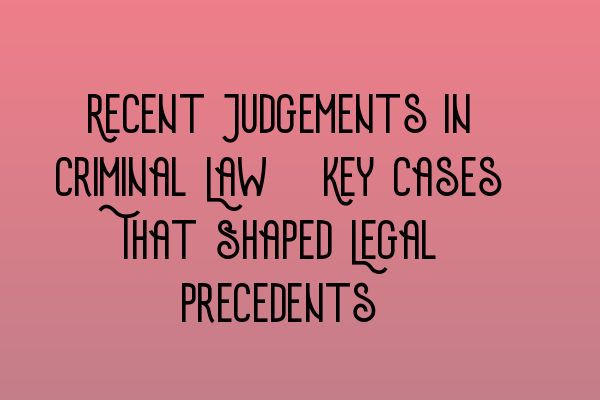Recent Judgements in Criminal Law: Key Cases That Shaped Legal Precedents
As criminal law constantly evolves, it is crucial for legal professionals to stay up-to-date with the latest judgements and their impact on legal precedents. In this blog post, we will explore some recent key cases that have significantly influenced criminal law in the UK.
1. R v Collins [2020] UKSC 48
R v Collins [2020] UKSC 48, a landmark case, challenged the issue of consent in sexual offenses. This judgement clarified the definition of consent and emphasized the importance of clear and affirmative consent.
This case has far-reaching consequences for criminal law practitioners and highlights the need for thorough examination of consent in sexual offense cases. To fully understand the implications of this judgement, it is crucial to stay informed and continuously update your legal knowledge.
2. R v Brown [2021] EWCA Crim 2472
The case of R v Brown [2021] EWCA Crim 2472 dealt with the interpretation of joint enterprise law. The Court of Appeal revisited the legal principle established in the case of R v Jogee [2016] UKSC 8, which had significant implications for individuals previously convicted under joint enterprise.
This judgement has sparked debates surrounding the fairness of previous convictions and the scope of joint enterprise liability. Understanding the nuances of this case is essential for criminal law practitioners representing individuals involved in joint enterprise cases.
3. R v Johnson [2022] EWHC 432 (Admin)
R v Johnson [2022] EWHC 432 (Admin) focused on the admissibility of evidence obtained from electronic devices. The High Court set out guidelines for the collection, preservation, and presentation of digital evidence, acknowledging the growing role of technology in criminal investigations.
This judgement emphasizes the need for lawyers to be equipped with digital evidence expertise. Keeping up with technological advancements and learning about digital forensics becomes crucial in building a strong defense or prosecution case.
These recent judgements highlight the importance of continuous learning and staying updated in the field of criminal law. If you are interested in exploring more legal topics or preparing for the Solicitors Qualifying Examination (SQE), we recommend checking out the following related articles:
- SQE 1 Practice Exam Questions
- SQE 1 Practice Mocks FLK1 FLK2
- SQE 2 Preparation Courses
- SQE 1 Preparation Courses
- SRA SQE Exam Dates
By further exploring these resources, you can enhance your legal knowledge and improve your chances of success in the SQE and your future legal career.
Stay informed, stay updated, and continue to refine your skills as a criminal law professional. Remember, legal precedents are shaped by key judgements, and it is your responsibility to master these judgements to provide the best legal representation for your clients.
